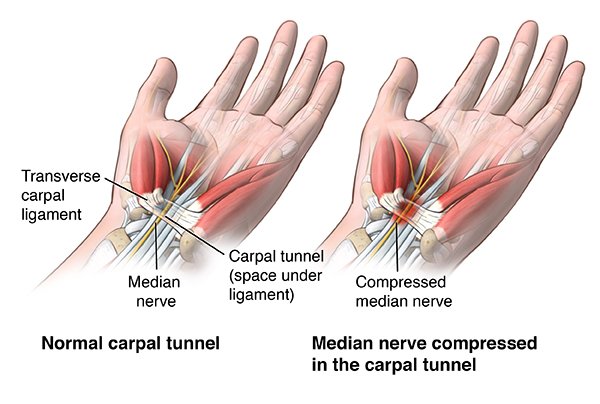Carpal Tunnel Syndrome: Causes, symptoms and treatments
Carpal tunnel syndrome (CTS) is a prevalent condition that affects millions of people worldwide. It's a condition that's often misunderstood, yet it can significantly impact daily life and productivity. Whether you're experiencing tingling sensations in your fingers, difficulty gripping objects, or numbness in your hand understanding the basics of carpal tunnel syndrome is crucial for effective management and treatment.
Image Credit: John Hopkins Medicine
So, what exactly is Carpal tunnel syndrome (CTS)?
CTS is caused by pressure on a nerve in your wrist called the median nerve. The median nerve runs from the forearm through a passageway in the wrist to the hand, known as the carpal tunnel. The median nerve provides sensation to the palm side of the thumb and all the fingers except the little finger. This nerve also provides signals to move the muscles around the base of the thumb, known as motor function.
Anything that irritates or squeezes the median nerve in the carpal tunnel space may lead to carpal tunnel syndrome - causes tingling, numbness and pain in your hand and fingers. These symptoms often start slowly and come and go, worsening at night, and can affect daily activities.
What can cause pressure on the median nerve?
There can be no single cause of carpal tunnel syndrome, and it may be that a combination of risk factors contributes to the development of the condition. The most known and common causes are repetitive motions, such as typing, however other injuries can apply pressure too - such as wrist fractures that can narrow the carpal tunnel and irritate the nerve. Rheumatoid arthritis and other diseases can also cause CTS due to swelling and inflammation.
What are the symptoms?
The symptoms of carpal tunnel syndrome include:
Numbness or tingling: You may experience tingling or numbness in your thumb, index, middle, and ring fingers. This sensation can extend from your wrist up your arm.
Weakness: You might notice weakness in your hand, making it difficult to grip objects or perform manual tasks.
Pain or discomfort: Some individuals experience aching or discomfort in the affected hand or wrist. This pain may radiate up the arm.
Burning sensations: You may feel a burning sensation in your fingers or palm.
Worsening symptoms at night: Many people with carpal tunnel syndrome find that their symptoms worsen at night, often disrupting sleep.
Difficulty with fine movements: Tasks that require fine movements, such as buttoning a shirt or picking up small objects, may become challenging.
Are there prevention strategies for CTS?
There are no proven strategies to prevent carpal tunnel syndrome, but activity modification and reducing the stress on the hands and wrists can help. Methods include:
Reducing your force and relax your grip. For example, if your work involves a cash register or keyboard - hit the keys softly.
Taking short, frequent breaks. Gently stretch and bend your hands and wrists periodically, and alternate tasks when possible – particularly if you use equipment that vibrates or that requires you to exert a great amount of force. Taking a break for even a few minutes each hour can make a difference.
Good form. When using a keyboard, a relaxed middle position with the wrists parallel to the floor is best. Keep your keyboard at elbow height or slightly lower.
Improving your posture. Adjust the screen height and distance of your computer, rather than adjusting your body. The wrong posture rolls shoulders forward, shortens the neck and shoulder muscles, and compresses nerves in the neck. This can cause neck, arm and hand pain.
Changing your computer mouse. Make sure that your computer mouse doesn't strain your wrist.
Keeping your hands warm. Hand pain and stiffness is more likely to occur if you work in a cold environment.
What treatments are available to help CTS?
You can often treat CTS yourself, but unfortunately it can take months to improve. The choice of treatment depends on individual factors such as the severity of symptoms, underlying health conditions, and personal preferences. In severe cases or when other treatments have failed, surgery may be recommended to cut the ligament that forms the top of the carpal tunnel, relieving pressure on the median nerve (Carpal Tunnel Release). Avoiding surgery is most likely top of everyone’s list, and the good news is there are many different treatments to be tried first, including:
Wrist Splinting: Wearing a splint to keep the wrist in a neutral position can help alleviate pressure on the median nerve, especially at night.
Medications: Nonsteroidal anti-inflammatory drugs (NSAIDs) like ibuprofen may help reduce pain and inflammation.
Physical Therapy: Specific exercises and stretches can improve strength and flexibility in the wrist and hand, relieving pressure.
Alternative Therapies: Acupuncture or chiropractic adjustments may provide relief for some individuals.
Corticosteroid Injections: Injecting corticosteroids into the carpal tunnel can reduce inflammation and provide temporary relief from symptoms - particularly for individuals experiencing moderate to severe symptoms that haven't responded to conservative measures.
Prolozone Injections: Injecting a mixture of ozone gas and nutrients into the affected area - aiming to stimulate tissue regeneration, reduce inflammation, and alleviate symptoms by promoting natural healing and strengthening the ligaments and tendons in the wrist, helping to repair any damage to the tissues surrounding the median nerve.
At Leigh Injection Clinic based in Leigh on Sea, Essex, we offer both steroid injections and prolozone injections to treat many different MSK related pains – including CTS. For more information please take a look at our website.
When it comes to managing your health, knowledge is power. Whether you're implementing ergonomic changes in your workspace, exploring therapeutic exercises, or considering medical interventions, taking proactive steps can make a world of difference in your quality of life. If you're experiencing any of the symptoms listed above, especially if they're persistent or interfere with daily activities, it's essential to consult a healthcare professional for an accurate diagnosis and appropriate treatment.
https://www.leighinjectionclinic.co.uk
https://www.hopkinsmedicine.org


